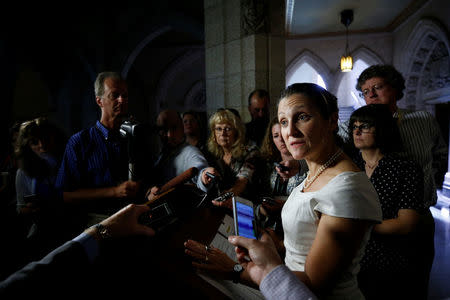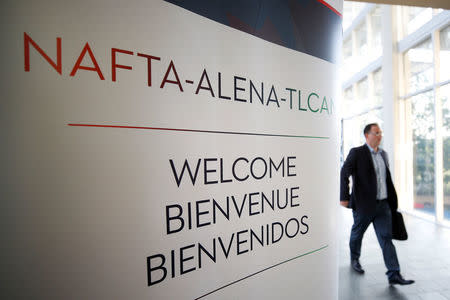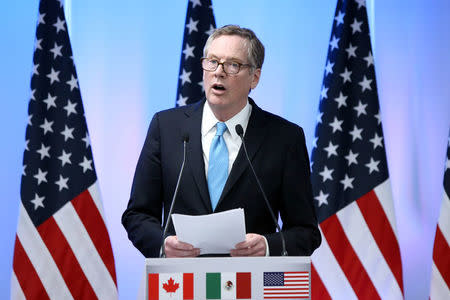Top NAFTA negotiators join talks as U.S. presents draft text on labour
By Lesley Wroughton and Adriana Barrera OTTAWA (Reuters) - The United States on Tuesday unveiled draft text on labour standards during the negotiations on modernizing the North American Free Trade Agreement as top officials from Canada, the United States and Mexico joined talks in Ottawa. The U.S. said the labour proposal would ensure enforceable mechanisms to raise labour standards in the NAFTA but Canadian labour unions said it was inadequate. U.S. Trade Representative Robert Lighthizer, Canadian Foreign Minister Chrystia Freeland and Mexico's Economy Minister Ildefonso Guajardo joined the talks on Tuesday. The countries are rushing to reach an agreement by the end of the year before Mexico's presidential campaign begins, a deadline that former trade negotiators have said is unrealistic. The labour proposal is the latest of three new draft texts presented by the U.S. in Ottawa. U.S. proposals on investment and intellectual property were also presented in this round after U.S. negotiator John Melle said "more challenging issues will start taking centre stage." Labour leaders of the two wealthier NAFTA nations say laxer labour standards and lower pay in Mexico have swelled corporate profits at the expense of Canadian and U.S. workers, making the issue one of the major battlegrounds of the NAFTA talks. Officials with knowledge of the U.S. proposal said it did not detail wage levels for workers. Mexican business leaders have argued that workers' rights and pay is an internal issue for each country to resolve. "With President Trump as one of labour's biggest supporters, the United States has put forward a detailed proposal that replaces the original NAFTA's toothless approach on labour with enforceable provisions to benefit workers across America," USTR spokeswoman Emily Davis said. "The United States' advocacy for workers includes seeking commitments from Mexico and Canada to respect collective bargaining and other core labour standards," she added. Canadian labour union leaders said the U.S. proposal resembled text outlined in the Trans Pacific Partnership trade pact with many Asian nations which Trump withdrew the U.S. from. "The U.S. proposal makes no sense to me," Jerry Dias, president of Canada's UNIFOR labour union, told reporters. "The American proposal is the TPP proposal with a bit of a twist, which isn't going to resolve the issues" of better working conditions. Teamsters Canada spokesman Christopher Monette said the Canadian proposal on labour went further in pushing for improved working conditions in all three NAFTA countries. "It is inadequate," Monette said of the US draft text. U.S. Congressman Sandy Levin, a Democrat from Michigan, who was in Ottawa at the weekend, cautioned on Monday that the Democratic party would not support a revised NAFTA agreement without "dramatic change" in Mexico's labour standards. "Mexico's so called 'comparative advantage' not only condemns numerous Mexican workers to working in or near poverty, but it lowers wages and rips away jobs from workers in the United States, especially in the auto industry," he told the Council on Foreign Relations. USTR's Davis said the negotiations were "progressing at an unprecedented pace" with the U.S. presenting text in 27 NAFTA chapters in the five weeks since talks began. Canadian and Mexican officials, however, have complained that the U.S. side has been slow to present proposals on the biggest issues which are likely to take time to negotiate. A joint statement on the Ottawa round is expected at 2:30 p.m. New York time (1830 GMT) on Wednesday. The next round of talks will be held in Washington around Oct. 11. Asked by reporters in Ottawa about the lack of specific proposals on key issues, chief U.S. negotiator John Melle, "We've been working very hard so I don't see a problem." The thorniest issue in the talks, NAFTA's rules of origin that determine how much of a product needs to originate in the NAFTA region, was discussed on Tuesday, according to a copy of the agenda obtained by Reuters, but the United States has still to present its demands on the issue. The Trump administration wants more substantial U.S. content in autos, the main source of the $64-billion trade deficit with Mexico and the $11-billion deficit with Canada. The United States draft text on NAFTA investment did not elaborate on changes to the dispute mechanism that allows an investor from a NAFTA country to sue a member government, according to two sources with knowledge of discussions. (Additional reporting by David Ljunggren; Editing by Nick Zieminski and Clive McKeef)

 Yahoo News
Yahoo News 


